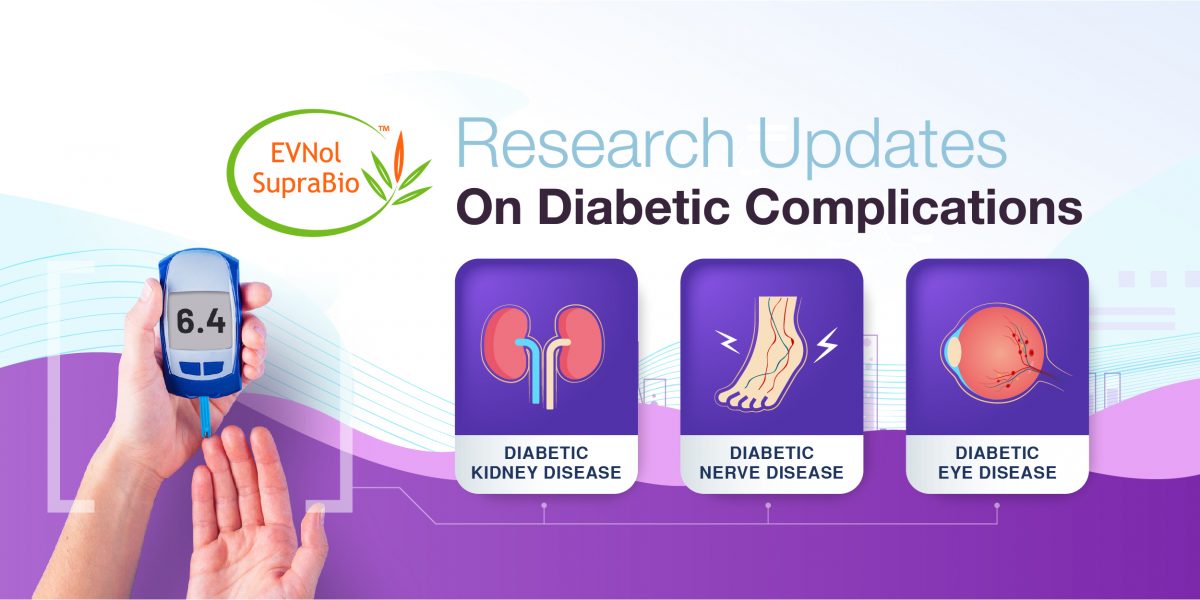Health conditions associated with diabetes

1. Endocrinologist Prof. Khalid Kadir explains the Diabetic Complications
2. Prof. Khalid Kadir Speaks About the Prevalence and Risk Factors of Diabetes
3. Prof. Khalid Kadir Explains the research of EVNol SupraBio on Diabetic Complications

Diabetes & related complications
Diabetes is a major health problem in Malaysia, with an estimated seven million adults to be affected by 2025. Currently, 3.6 million Malaysians are suffering from the disease, making it the highest rate of incidence in Asia (1). Long-term diabetes comes with various complications which could greatly impair an individual’s quality of life and brings about significant morbidity as well as mortality. The complications associated with diabetes are divided into 2 categories which are macrovascular complications (cardiovascular disease, stroke, etc.) and microvascular complications (nephropathy, retinopathy, and peripheral neuropathy). The longer a person suffers from diabetes, the higher the chances for him/her to get serious health problem arising from diabetes. To make things worse, there is no effective cure or treatment for these complications, hence adjuvant therapy to manage these complications is much warranted.
With the intention to identify a natural alternative to help diabetic patients overcome these complications and gain better quality of life, Malaysia’s renowned endocrinologist – Professor Emeritus Dato’ Dr Khalid Abdul Kadir and his research team embarked on human clinical trials with palm tocotrienol complex produced locally from Malaysian Palm Oil (Non-GMO).
As an endocrinologist, Professor Khalid’s research area involves understanding metabolic stress and how the body adapts to it. The aim of his research is to establish the potential mechanisms of action(s) of Vitamin E tocotrienol on diabetes and its microvascular complications, namely nephropathy, retinopathy and neuropathy. Professor Khalid has started his research on nutrition, palm oil’s Vitamin E and its benefits on diabetes since the 1980s. Starting from in-vitro studies, he has moved to animal studies and now is actively conducting at least 5 randomized, double-blinded, placebo-controlled studies using bioenhanced tocotrienol (EVNol SupraBio™) on diabetic complications.
Diabetic Retinopathy
Another microvascular complication caused by diabetes is diabetic retinopathy. Diabetic retinopathy occurs when there is retinal haemorrhage occurring in the eyes due to elevated and accumulated blood sugar in the blood vessels of the eye. According to the International Agency for the Prevention of Blindness, by the year 2040, there will be 642 million people suffering from diabetes and out of this, 224 million of diabetics will end up having some form of diabetic retinopathy.
A pilot phase II clinical trial revealed that 8 weeks supplementation of EVNol SupraBio™ resulted in significant reduction in retinal haemorrhage in the right eye of diabetic retinopathy patients. The result is now pending for publication. Another study on diabetic retinopathy on larger cohort and longer supplementation is now ongoing and the result is expected to be out soon.
Professor Emeritus Dr. Khalid Abdul Kadir
In the course of his extensive research, Professor Khalid has made many significant contributions to the field of endocrinology. Professor Khalid has been selected to receive the prestigious Merdeka Award for his contributions to two areas of endocrinology, namely for his work on the study and understanding of diabetes, and the relationship between hormones and stresses in various tissues.
Professor Khalid’s numerous achievements have had a deep and lasting impact on Malaysia and Malaysian society. With nearly 300 published articles on diabetes and endocrinology, and with his continuing research efforts, Professor Khalid has significantly improved the understanding of endocrinology. His research on the efficacy of diabetes treatment and monitoring of diabetes in Malaysia has aided in formulating strategies to combat the disease. His work has also contributed to the development and implementation of national strategies and programmes to prevent and control diabetes, and reduce its risks. Professor Khalid’s epidemiology research and clinical drug trials has been proved to revolutionise the field of endocrinology especially in managing diabetic complications.
Diabetic Peripheral Neuropathy (DPN)
Chronic hyperglycemia increases oxidative stress, activates inflammatory pathways and reduces nerve growth factor (NGF) among diabetic patients, which contribute to development of diabetic peripheral neuropathy (DPN). Approximately 50% of the diabetic population is affected by this condition and of this, half of them are asymptomatic, while the other half will either experience distressing neuropathic pain or numbness.
From the research, it has been discovered that serum nerve growth factor (NGF) is significantly elevated among the participants on tocotrienol (EVNol SupraBio™) supplementation compared to placebo, at eight weeks post-intervention. This increase in serum NGF reflects the reversal of neuronal injuries as well as the restoration of nerve function, and thus suggesting that EVNol SupraBio™ most probably acts through the pathway involving NGF—and not the oxidative stress or chronic inflammatory pathogenesis—to improve DPN. This finding is fascinating as no study in the past has shown that tocotrienol-Rich Vitamin E can increase serum NGF level among the diabetic population and correlated it to improvements in terms of peripheral nerve conduction velocities (2).
Diabetic Nephropathy (DN)
Besides that, diabetic nephropathy (DN), also known as diabetic kidney disease, is one of the major complications of diabetes. Diabetes is responsible for over 40% of new cases of end-stage renal disease and now has become the leading cause of kidney failure.
Interestingly, in the randomized, double-blinded, placebo-controlled study, it is discovered that after 12 weeks of supplementation of tocotrienol (EVNol SupraBio™), there was a significant decrease in serum creatinine resulting in an increase in estimated glomerular filtration rate (eGFR). The patients in the placebo group showed a contrasting result. These results confirmed the previous study that was conducted in 2018 (3) where it was found that 8 weeks of EVNol SupraBio™ supplementation reduced serum creatinine in patients with diabetic nephropathy.
Another novel finding from this study is the benefits of EVNol SupraBio™ on these diabetic patients persist although they have stopped the supplementation for 6-9 months. This phenomenon – what we would call – the “Legacy Effect of Tocotrienol” demonstrates that the serum creatinine of the diabetic patients are still stable even after the cessation of EVNol SupraBio™, and to the best of our knowledge, this is the first time a study has reported such findings (4).
Webinar Recording – “Research on Super Vitamin E Tocotrienol and metabolic health”
Watch this video to learn about the latest clinical findings and how Super Vitamin E Tocotrienol functions in the body to specifically support metabolic related health conditions and why this key branded-ingredient (EVNol SupraBio™) can be included in products to support and maintain metabolic health and a healthy immune system.
Referennces:
- Health Ministry: Seven million M’sians may suffer from diabetes by 2025
- YT Ng, et al. (2020, May). The Effects of Tocotrienol-Rich Vitamin E (Tocovid) on Diabetic Neuropathy: A Phase II Randomized Controlled Trial. Nutrients, 12(5), 1522. doi:10.3390/nu12051522
- Tan, SMQ, et al. (2018). Tocotrienol-rich vitamin E from palm oil (Tocovid) and its effects in diabetes and diabetic nephropathy: A pilot phase II clinical trial. Nutrients, 10(9), 1315. doi:10.3390/nu10091315
- Tan, G., Tan, S., Phang, S., Ng, Y. T., Ng, E. Y., Ahmad, B., Palamisamy, U., & Kadir, K. A. . (2019). Tocotrienol-rich vitamin E improves diabetic nephropathy and persists 6-9 months after washout: a phase IIa randomized controlled trial. Therapeutic advances in endocrinology and metabolism, 10, 2042018819895462. doi:10.1177/2042018819895462